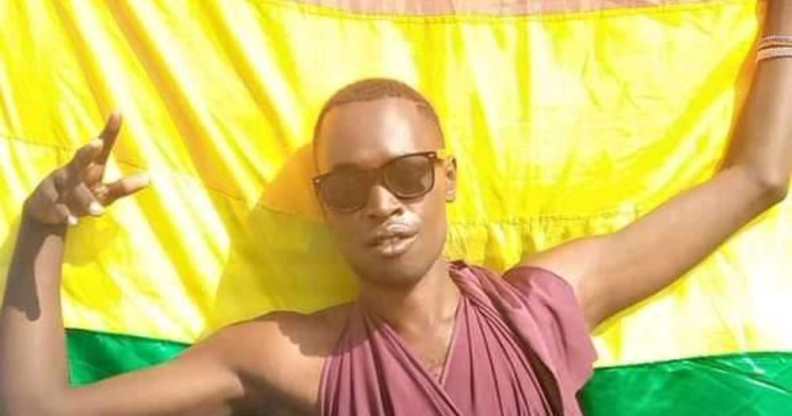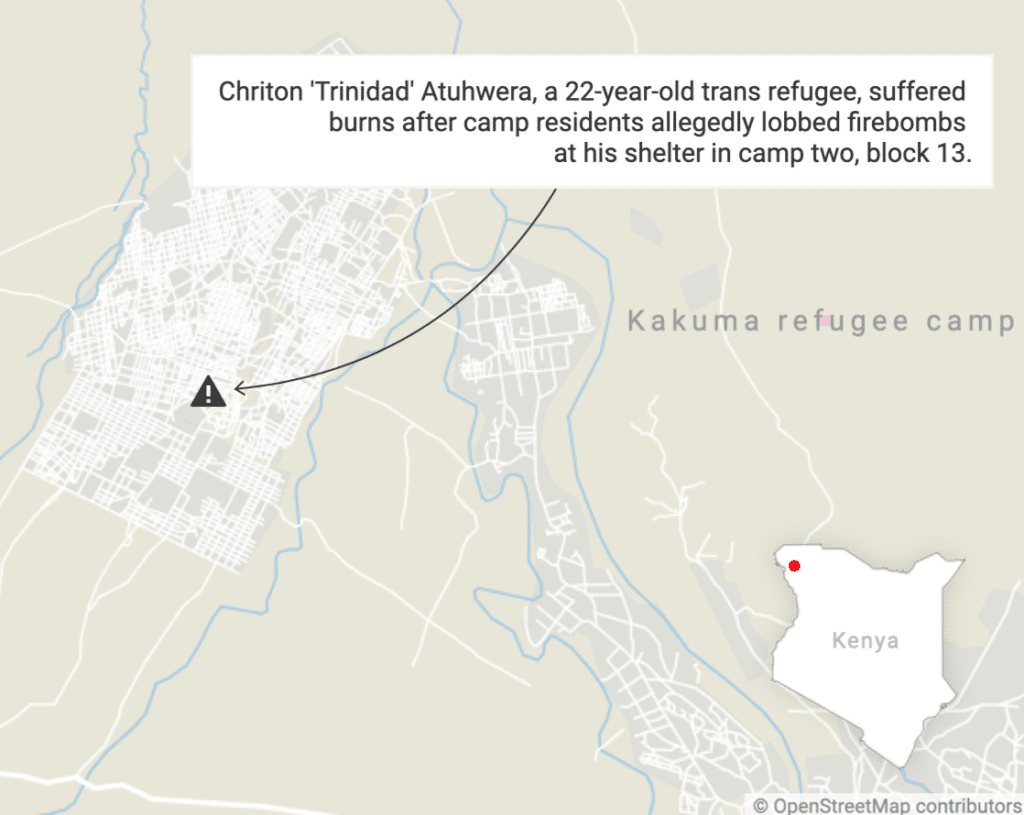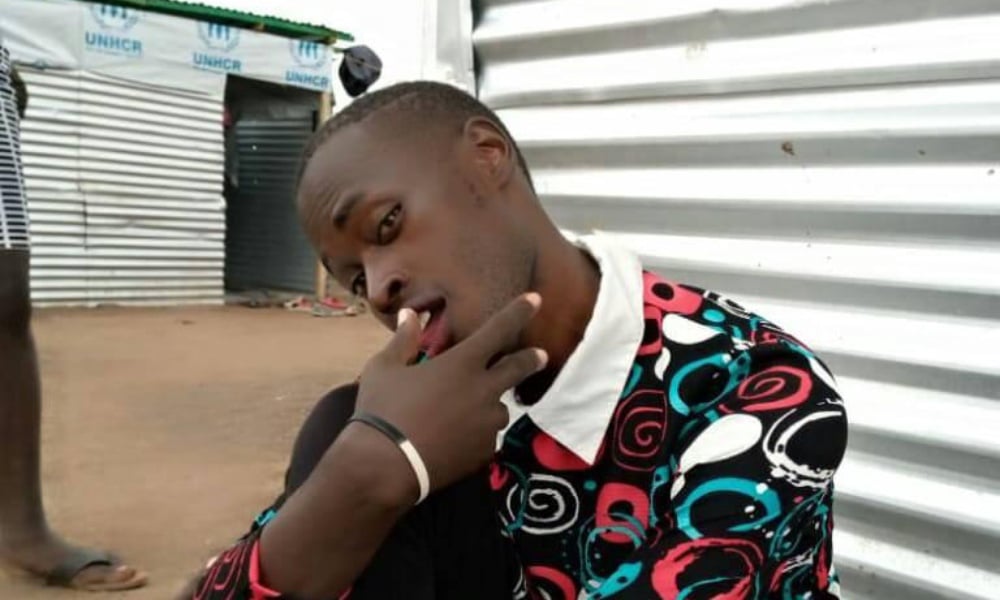Beloved trans man dies after horrific petrol bomb attack in Kenyan refugee camp

Chriton ‘Trinidad Jerry’ Atuhwera. (Facebook)
A trans man died Monday (12 April) after thugs firebombed his shelter at the Kakuma Refugee Camp, Kenya.
Described by those who knew him as a dependable man who never gave up hope, Chriton “Trinidad Jerry” Atuhwera, was a “proud trans man”, a poet and admired leader among the camp’s queer refugees.
Last month, a gang lobbed incendiary devices into the place Atuhwera, his partner Jordan Ayesigye and others called home.
Fire quickly tore through the shelter, leaving the couple critically injured alongside several other refugees. Less than a month later, Atuhwera passed away of his burns at the Kenyatta National Hospital in Nairobi.
The 22-year-old had fled from Kampala, Uganda, to the camp as he sought to escape homophobia and hardship. He was forced to abandon his degree in business administration due to abuse, Amnesty International Kenya said in a statement.
He was a “leading example” for Kakuma’s residents, Emmanuel Kiyimba, a gay Ugandan living in the camp, told PinkNews.
Sebuuma Stephen, a trans refugee who has since left the camp, counted Atuhwera as a close friend during their years-long stay at Kakuma.
“He was the kind of guy people could always rely on,” Stephen told PinkNews. “He was good, comforting.
“Even if there was no solution, he always kept hope.”
Catastrophes are an all too familiar sight in Kakuma, a small town in northwestern Kenya and the site of one of the largest refugee camps in the country.

(PinkNews)
The camp is co-managed by the United Nations High Commissioner for Refugees, the Kenyan government and the Kenyan Department of Refugee Affairs.
UN Refugee Agency officials expressed their sadness and frustration at the news of Atuhwera’s death and urged Kenyan authorities “to accelerate their investigation into the alleged attack and hold those responsible to account”.
‘Most of us thought that it was the end for us all’
Due to the dizzying rates of violence inflicted upon them by other residents, many queer refugees live together in block 13.
“Being LGBT+ in the camp is the biggest trauma I have ever experienced,” said Kiyimba.
There are around 130 LGBT+ refugees living in the complex, according to a GoFundMe that is raising funds for their day-to-day expenses.
Kiyimba woke up at around 2:45am to the sound of an explosion. He felt groggy, and the usually mild, early morning air was warm.
“I got up when I heard the explosion within our shelter’s area,” he recalled. “I heard screaming and I ran out to see.
“I saw much fire within the area, shelters turned red because of the fire. Everyone was running to save their lives, children and women were crying and screaming loudly as they ran out of the shelters to safety.”
Kiyimba alleged that other residents of the camp had lobbed a makeshift bomb into the shelter while they slept.
As the flames razed the area and ripped through block 13, Kiyimba said: “Most of us thought that it was the end for us all.”
Then Kiyimba saw Chriton Atuhwera and Jordan Ayesigye.
“They were burning like a piece of paper, they were both trying to get out of the shelter but the burning fire was too much,” he said.
The burns the couple suffered covered most of the lower halves of their bodies, including their feet and legs and, for one, his genitals, according to photographs seen by PinkNews.

For the queer refugees, the fire – and the death of one of their own – was a brutal reminder of the challenges they face even after fleeing their homophobic hometowns. (Facebook)
All that was left were the smouldering ruins of the shelter and blackened shrubbery, ribbed metal roof panels and tarpaulin sheets.
Camp residents believe the attack was fuelled by homophobia.
“The rest of the neighbourhood wasn’t happy with them sharing a house,” claimed Sebuuma Stephen, “suspicious that they are a couple.
“So, they decided to burn their home.”
Atuhwera and Ayesigy were rushed to a clinic on the camp run by the International Rescue Committee, a global relief organisation that oversees the camp.
By 17 March, thanks to lobbying efforts by the queer camp activists, the couple was transferred to Lodwar Hospital for treatment. However, the facility lacked the proper supplies to treat their burns.
As a result, the UNHCR airlifted them both to Kenyatta National Hospital in the country’s capital city.
“After [Atuhwera’s] admission, it was established that he was suffering from previous health issues for which he was also receiving treatment,” the agency said.
“Unfortunately, his condition deteriorated and, despite the medical team’s best efforts, he passed away this morning.”

Chriton ‘Trinidad Jerry’ Atuhwera. (Facebook)
The agency added that Ayesigye “is recovering and is expected to be discharged soon”.
“We are deeply shocked by this tragic loss and wish to express our sincere condolences to the family and friends of the victim,” said Fathiaa Abdalla, UNHCR’s Representative in Kenya.
“We urge the Kenyan authorities to accelerate their investigation into the alleged attack and hold those responsible to account.”
For a community already on edge, the attack on the camp was the latest tragedy for exhausted residents, many forced to live with limited access to basic medicines and food.
“We cannot buy items in some shops in the camp,” Kiyimba explained.
“These people think that if we buy from them then we will leave a curse on their shops because they believe being LGBT+ is a curse
“They simply don’t sell to us and chase us before even reaching near them.”
And added to the list of their woes, they spar with gangs of anti-LGBT+ refugees who have raped them, pelted them with rocks, struck them with sticks and stones and threatened to kill them on an almost daily basis.
The refugees are urging people to donate to their GoFundMe as well as to a donation page set up by Australian activist group, Human in Need.
“As the LGBT+ community in the camp, we can not sleep at all,” Kiyimba said.
“All the time we are in fear as we are targeted by the rest of the refugee communities. We sleep in shifts, some sleep, while others keep watch.
“We never thought all would end like this. We came to Kenya seeking protection, but we are perishing.”

